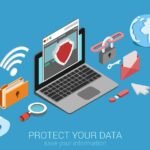When organizations use AI-powered platforms whether in education, healthcare, or social impact they become custodians of sensitive data. For schools and NGOs, this includes student information, community records, and personal identifiers. In this context, understanding and implementing data privacy is not just a legal obligation; it’s a core ethical responsibility and a pillar of trust.
This guide breaks down the essential principles of data privacy and provides a practical framework for protecting your community’s information while leveraging the power of AI.
Why Data Privacy is the Foundation of Digital Trust
Data privacy is the right of individuals to control how their personal information is collected, used, and shared. In the age of AI, even basic user interactions—from messages and learning progress to location check-ins—generate valuable data. For mission-driven organizations, protecting this data is fundamental to success. It allows you to:
- Build and Maintain Trust: When users, beneficiaries, and stakeholders feel their data is safe, they are more likely to engage with your programs and support your mission.
- Mitigate Legal and Reputational Risks: Non-compliance with data protection laws can lead to heavy fines and, more importantly, a loss of credibility that can be difficult to recover.
- Ensure Responsible AI Use: Ethical AI is impossible without strong data privacy. Protecting data from misuse is the first step toward ensuring the tools you use are fair and responsible.
Understanding the Key Risks in the AI Era
Being aware of the most common privacy pitfalls is the first step toward preventing them. Here are the key risks to watch for:
- Unnecessary Data Collection: Some tools are designed to gather far more data than is required for their function. This “data bloat” increases your liability and the potential harm from a breach.
- Lack of Informed Consent: If users don’t clearly understand what data is being collected and why, you haven’t obtained meaningful consent. Hidden clauses in long terms-of-service agreements are no longer sufficient.
- Weak Security Practices: Using platforms with poor encryption, insecure storage, or a lack of multifactor authentication exposes your data to unacceptable risks of being leaked or stolen.
- Bias Amplification: AI models trained on datasets that include sensitive attributes like age, gender, or ethnicity can lead to biased or discriminatory outcomes, even if the intent was not malicious.
Global regulations like Europe’s GDPR (General Data Protection Regulation) and specialized laws like the U.S.’s FERPA (for education) and COPPA (for children) were created to address these very risks. Adhering to their principles is now considered a global best practice.
A Practical Framework for Protecting User Data
Here is a set of best practices to guide your organization in protecting user data when using AI systems.
- Adopt Data Minimization: Make it a policy to only collect data that is absolutely necessary for a specific, stated purpose. If you don’t need it, don’t collect it.
- Champion Transparency and Consent: Clearly and simply explain your data practices in an accessible privacy policy. Ensure consent is actively given, not assumed.
- Vet Your Vendors Thoroughly: Before adopting any new AI tool, scrutinize its privacy and security standards. Look for GDPR compliance, transparent policies, strong encryption (HTTPS, 2FA), and options to export or delete user data.
- Empower Your Team: Conduct regular training to help your staff understand data privacy principles and identify potential risks. Your team is your first line of defence.
- Conduct Regular Audits: Periodically review the tools you use and your internal data handling processes. Update your policies as needed and promptly address any vulnerabilities.
From Compliance to a Culture of Privacy
Protecting user data is not a one-time task to be checked off a list; it is a continuous commitment that signals your organization’s core values. In a world of frequent data breaches and growing scepticism, demonstrating a robust commitment to privacy is one of the most powerful ways an NGO or school can earn and keep the trust of the people it serves.
The goal is to move beyond mere compliance and build an organizational culture of privacy. This means embedding privacy considerations into every decision—from choosing a new software platform to designing a community program. It means remembering that behind every data point is a human being: a student, a beneficiary, a community member who has placed their trust in you.
Building this culture requires dedication and, often, expert guidance. If you are ready to move beyond the basics and build a robust data privacy framework tailored to your mission, reach out to the FutureCode team. We offer consultations and privacy audits to help you protect your community, build lasting trust, and ensure your use of technology always aligns with your values.







